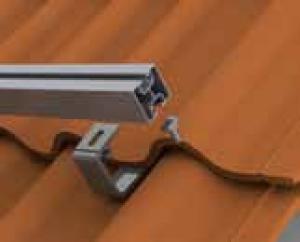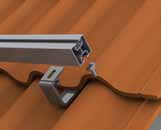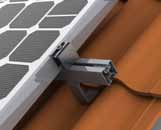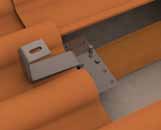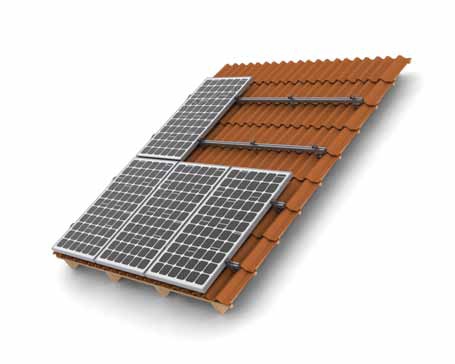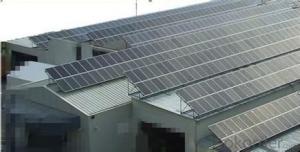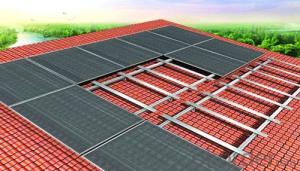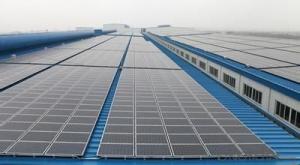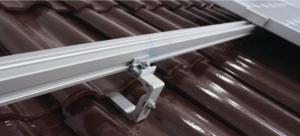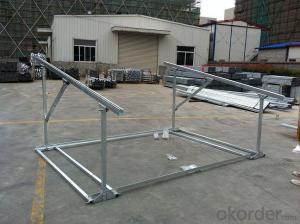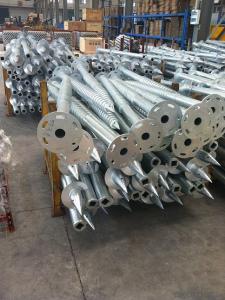Solar Energy Systems - Solar Mounting Tile-On Roof System PNG
- Loading Port:
- China Main Port
- Payment Terms:
- TT OR LC
- Min Order Qty:
- -
- Supply Capability:
- -
OKorder Service Pledge
OKorder Financial Service
You Might Also Like
Product Features
• Widely used for both crystalline and thin film modules.
• Easy & quick installation.
• Only 4~5 kinds of components and no more than three kinds of tools in whole system fixation.
• All system components are made with high quality aluminum & stainless steel.
Technical Data
Project site Sloped roof tile
Tile type Wave, trapezoidal, and various upright side whipstitch forms of caigang watts
Slope of roof On request
Roof specification Frame / frameless module, crystalline/ thin film module
Installation type fixation on the roof
Module arrangement Portrait Landscape
Module area square Client requirement
Module area position Client requirement
Roof structure Client requirement
Loading section Al 6063 T5
Roof hook Stainless steel
Small pieces Stainless steel, Al6063 T5
- Q: Can solar energy systems generate power during cloudy days?
- Yes, solar energy systems can still generate power during cloudy days. While the amount of electricity produced may be reduced compared to sunny days, solar panels can still convert diffuse sunlight into usable energy.
- Q: Can solar energy systems be used in powering scientific research vessels or marine laboratories?
- Yes, solar energy systems can be used to power scientific research vessels or marine laboratories. Solar panels can be installed on the vessels or on nearby platforms to harness sunlight and convert it into electricity, which can then be used to power various equipment and systems onboard, such as navigation devices, communication systems, lighting, and scientific instruments. This not only reduces reliance on fossil fuels but also provides a sustainable and renewable energy source for these facilities, enabling them to operate efficiently and environmentally responsibly.
- Q: How do solar energy systems affect the electrical grid?
- Solar energy systems can have both positive and negative effects on the electrical grid. On one hand, they contribute to a more decentralized and sustainable energy system by generating clean electricity locally. This reduces the need for long-distance transmission lines and decreases transmission losses. On the other hand, the intermittent nature of solar power can create challenges for grid operators in maintaining a stable supply-demand balance. However, with proper grid integration and smart technologies like energy storage, solar energy systems can help enhance grid reliability and resilience.
- Q: How does the age of a solar energy system affect its performance?
- The age of a solar energy system can significantly affect its performance. Over time, solar panels can experience a decrease in efficiency due to various factors. One of the main factors is the degradation of the photovoltaic cells themselves. The cells can deteriorate over time due to exposure to sunlight, extreme temperatures, and other environmental factors. This degradation can result in a decrease in the system's overall power output. Additionally, the components of the solar system, such as inverters and wiring, may also experience wear and tear over time. Inverters are responsible for converting the direct current (DC) generated by the solar panels into usable alternating current (AC) electricity. As they age, inverters can become less efficient or even fail, which can affect the system's performance. Another aspect affected by the age of a solar energy system is the technology itself. Solar technology is constantly evolving, and newer systems tend to be more efficient and produce higher power outputs compared to older systems. Therefore, older solar energy systems may not be able to match the performance of newer, more advanced systems. Regular maintenance and inspections can help mitigate some of the performance issues related to the age of a solar energy system. Cleaning the panels to remove dirt and debris, checking for any loose connections, and ensuring that the system is properly aligned can all contribute to maintaining optimal performance. In conclusion, the age of a solar energy system can impact its performance due to the degradation of photovoltaic cells, wear and tear on components like inverters, and the advancements in solar technology. Regular maintenance and staying up to date with the latest advancements can help prolong the lifespan and optimize the performance of a solar energy system.
- Q: Can solar energy systems be used in areas with limited roof access for maintenance?
- Yes, solar energy systems can be used in areas with limited roof access for maintenance. While it is more common to install solar panels on rooftops for optimal sun exposure, there are alternative options available. Ground-mounted solar panels can be installed in areas where roof access is limited, allowing for easier maintenance and cleaning. Additionally, solar panel systems can also be integrated into other structures such as carports or pergolas, providing an alternative to traditional rooftop installations. These alternatives ensure that solar energy systems can be utilized effectively in areas with limited roof access for maintenance.
- Q: How does the efficiency of solar panels vary across different panel sizes?
- The efficiency of solar panels generally does not vary significantly across different panel sizes. The efficiency of a solar panel is primarily determined by the quality of the materials used and the technology employed in its manufacturing, rather than its physical size. However, it is worth noting that larger panels typically have a higher wattage output, which means they can generate more electricity per unit of area.
- Q: Can solar energy systems be used for powering off-grid research facilities?
- Yes, solar energy systems can definitely be used to power off-grid research facilities. Solar panels can generate electricity by capturing the sun's energy, which can then be stored in batteries for later use. This makes solar power a reliable and sustainable option for off-grid research facilities, providing a constant source of electricity without the need for traditional power grids. Additionally, solar energy systems can be easily installed in remote areas, making it an ideal choice for powering research facilities located in off-grid or isolated locations.
- Q: Can solar energy systems be used in areas with limited roof access for maintenance?
- Solar energy systems can indeed be utilized in areas where roof access for maintenance is limited. Although the usual practice is to install solar panels on rooftops for maximum exposure to sunlight, there are alternative choices to consider. One option is to install ground-mounted solar panels in areas where roof access is restricted, making maintenance and cleaning tasks simpler. Furthermore, solar panel systems can be integrated into other structures like carports or pergolas, offering an alternative approach to the conventional rooftop installations. These alternatives guarantee the effective utilization of solar energy systems in areas with limited roof access for maintenance.
- Q: How do solar energy systems impact wildlife habitats?
- Solar energy systems can have both positive and negative impacts on wildlife habitats. On one hand, they can help reduce greenhouse gas emissions and mitigate climate change, which can benefit many species by preserving their natural habitats. Additionally, solar installations can serve as a habitat for certain species, providing shelter and food sources. However, there are also potential negative impacts, such as the loss of vegetation and disruption of ecosystems during the construction and operation of solar farms. It is important to carefully plan and manage solar installations to minimize these impacts and ensure coexistence with wildlife habitats.
- Q: Can solar energy systems be installed on mobile homes or RVs?
- Yes, solar energy systems can be installed on mobile homes or RVs. In fact, they are a popular choice for powering these vehicles as they provide a reliable and sustainable source of electricity while on the move. Solar panels can be mounted on the roof of the mobile home or RV, and the system can be customized to meet the specific energy needs of the vehicle.
Send your message to us
Solar Energy Systems - Solar Mounting Tile-On Roof System PNG
- Loading Port:
- China Main Port
- Payment Terms:
- TT OR LC
- Min Order Qty:
- -
- Supply Capability:
- -
OKorder Service Pledge
OKorder Financial Service
Similar products
Hot products
Hot Searches
Related keywords
